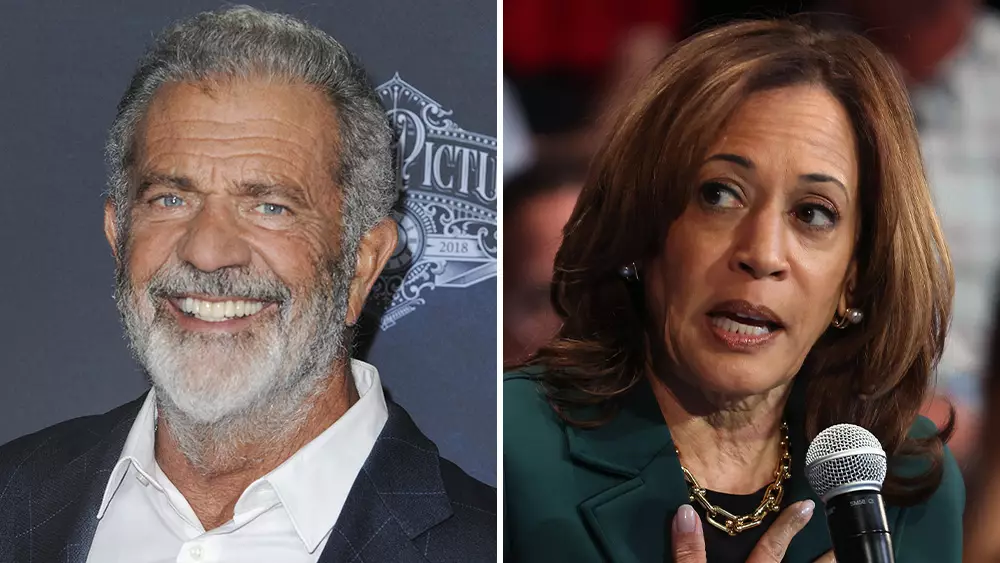Just days ago, Andrew Garfield expressed admiration for director Mel Gibson, noting the “beautiful healing” the filmmaker has supposedly undergone in the years following a series of highly publicized controversies. Garfield’s commendation seemed to underscore a narrative of growth and redemption. However, recent comments made by Gibson at LAX, particularly his derogatory remarks about Vice President Kamala Harris, call into question the validity of Garfield’s sentiments and raise concerns about Gibson’s enduring controversial nature. With a history marred by offensive statements and legal troubles, it is essential to analyze Gibson’s recent remarks in the context of his previous actions while considering their broader implications.
While responding to TMZ inquiries, Gibson stated that Kamala Harris possesses “the IQ of a fence post,” showcasing a lack of respect for the Vice President. He expressed his support for Donald Trump, claiming that Harris’ victory would be detrimental for the country. This sentiment echoes a pattern of derogatory commentary directed at political figures by Gibson—a tactic that seems to align him with a faction of public discourse that thrives on personal attacks rather than constructive dialogue.
In this instance, Gibson’s reference to Harris’s intelligence mirrors remarks made by Donald Trump, who has consistently disparaged Harris in similar terms. Such parallels suggest that Gibson may be relying on familiar tropes from Trump’s playbook, blending praise for the former president with unnecessary ridicule of opponents. As both men have displayed patterns of incendiary language, it raises the question of whether Gibson has genuinely evolved or simply reassumed a role within a toxic narrative that has polarized American politics.
To fully understand Gibson’s recent comments, one cannot overlook his troubled past. The Oscar-winning director has faced numerous accusations of bigotry and misogyny, with incidents dating back over a decade. In 2006, Gibson was arrested for DUI and was recorded making antisemitic remarks, claiming, “the Jews are responsible for all the wars in the world.” Despite multiple apologies, these incidents cast a long shadow over his public persona.
Additionally, his tumultuous relationship with ex-girlfriend Oksana Grigorieva involved a series of recorded rants filled with violent and racist language. In one angry tirade, Gibson expressed despicable views towards Black individuals, making it clear that much of his communication is not only aggressive but also rooted in prejudicial attitudes. These past actions stand in stark contrast to any narrative of healing or personal development that Gibson might wish to present today.
Kamala Harris has not publicly responded to Gibson’s remarks, but her own commentary on Trump offers insight. She has labeled him “increasingly unhinged and unstable” and described him as a “fascist” in various discussions. Harris’s statements reflect a broader resistance against the type of rhetoric that Gibson has employed, embodying a commitment to higher standards of political discourse.
Notably, Gibson’s situation illustrates the complications of public figures who oscillate between purported growth and sustained patterns of harmful behavior. The contrasts in how influential voices like Harris respond to such rhetoric demonstrate the critical importance of accountability and the potential impacts of celebrity statements on public discourse.
As Andrew Garfield celebrates Gibson’s supposed transformation, the reality presented by Gibson’s recent comments reminds us of the enduring nature of toxic behavior. The director’s backhanded insults toward a political leader reflect an ongoing inability to engage in respectful or constructive dialogue, which undermines hopes for his redemption. It reinforces the idea that while people can change, those changes are often slow and riddled with setbacks. The question remains: can true healing occur when the language employed continues to perpetuate division and disrespect?
In the end, public figures must recognize the weight of their words and the influence they wield, particularly as we navigate an increasingly contentious political environment.ск A dialog rooted in insults ultimately serves neither Gibson nor those he chooses to attack, leaving a bitter aftertaste that overshadows any claims of personal growth.

Leave a Reply